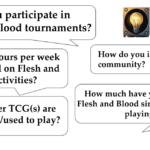The FaB World Premiere of The Hunted, along with the Calling, BH and side events, brought together more than 900 players from around the globe in Prague. This monumental gathering not only showcased the game’s explosive growth but also highlighted the passion of its ever-expanding community.
At the previous Calling in Florence, I conducted my first survey of the Flesh and Blood community. The enthusiasm from participants encouraged me to dive deeper into the player base once again. So, on the final day of the event, I spent a solid two hours roaming the venue, approaching over 100 players with a quick survey. I wanted to uncover more about their demographics, motivations, gameplay experiences, and how these factors shape the community.
Before we dive into the results, I want to express my sincere thanks to all the participants who took a moment to trust a random (but admittedly charming) guy with a QR code running around between matches. I did my best so that the insights I’m about to share make your time worthwhile.
A note about stats
Beyond the demographic details—which serve mainly to provide context for the sample—the interactions I’m about to present are statistically significant. I aimed to survey over 100 players (109) to ensure that each grouping in the analysis had a solid sample size. While I’ll spare you the details of χ² statistics and p-values, the findings are very unlikely to be due to random noise. To minimize bias, I made a conscious effort to select respondents as randomly as possible throughout the event.
Demographics: who are the players?
The participants in the survey represented a wide age range, but the majority were between 26 and 35 years old. The geographic diversity was particularly striking, with Germany leading the charge, followed closely by the UK, Italy, and France. It’s clear that Flesh and Blood has become a global sensation, appealing to players from all corners of the world. In the word cloud below you can visualize all the countries being represented.
In terms of skill levels, the ELO ratings revealed a broad spectrum. Most players fell into the mid-range brackets, suggesting that while Flesh and Blood offers competitive depth, the event attracted players at all skill levels. This spread hints at a community that balances casual engagement with a drive for improvement.
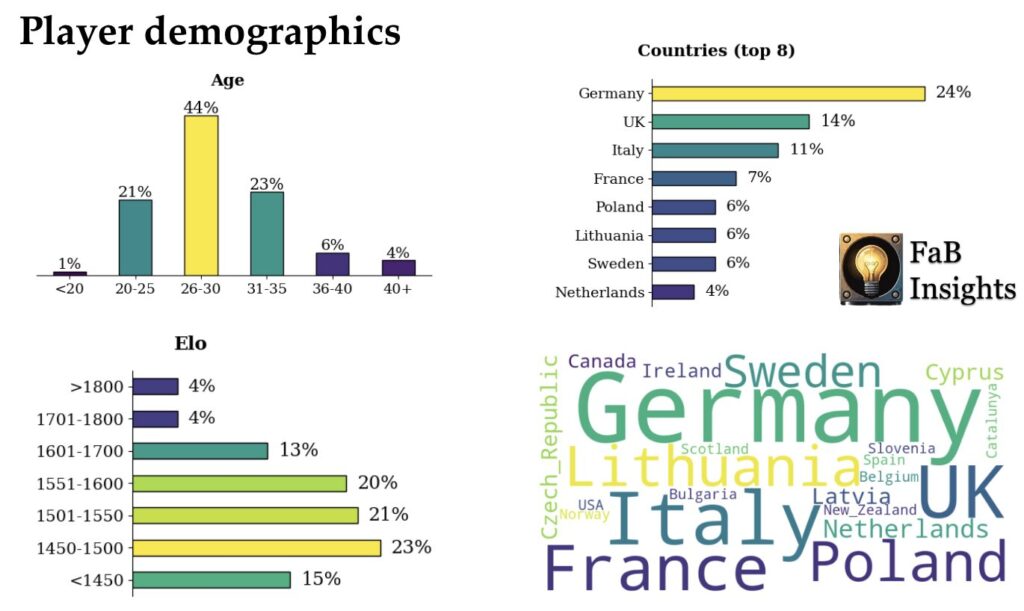
Key Variables: Preferences, Goals, and Experiences
Deck Archetypes and Class Preferences
When it comes to deck archetypes, aggro decks were by far the most popular. This points to a clear preference for fast-paced, aggressive strategies. Midrange and control decks were also well-represented, with combo archetypes taking a more niche position.
In terms of class preferences, Ninja and Assassin were the standout choices—likely influenced by the release of the new set. But what stands out is the diversity of class preferences, showcasing how the game caters to a wide range of playstyles.
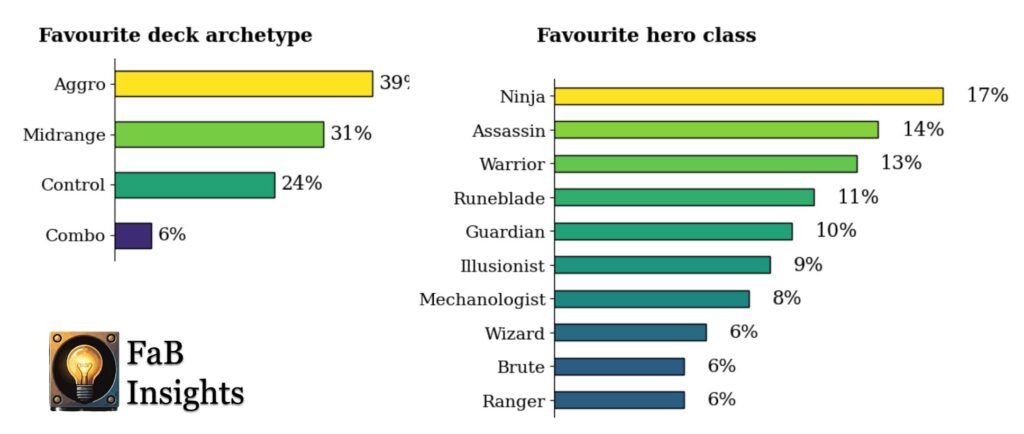
Motivations for Playing
Half of the players identified competitive success as their primary goal. However, a significant portion also valued skill improvement or casual enjoyment. Only a small percentage were driven by the pursuit of global recognition. This reveals that while the Flesh and Blood community is highly competitive, there’s an appreciation for personal growth and having fun with the game.
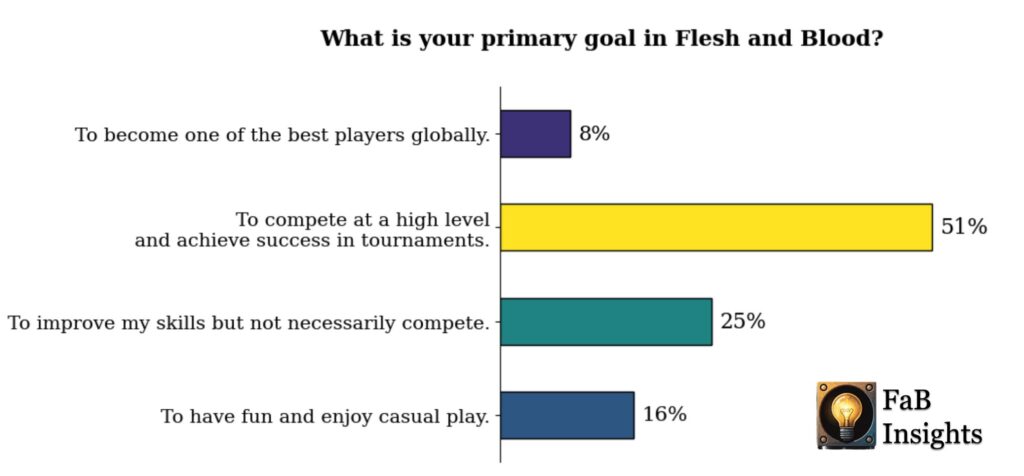
Luck vs. Skill
A key finding was that most players perceive Flesh and Blood as a skill-intensive game, with luck playing a secondary role. This reinforces the game’s reputation as one where strategy and mastery are paramount.
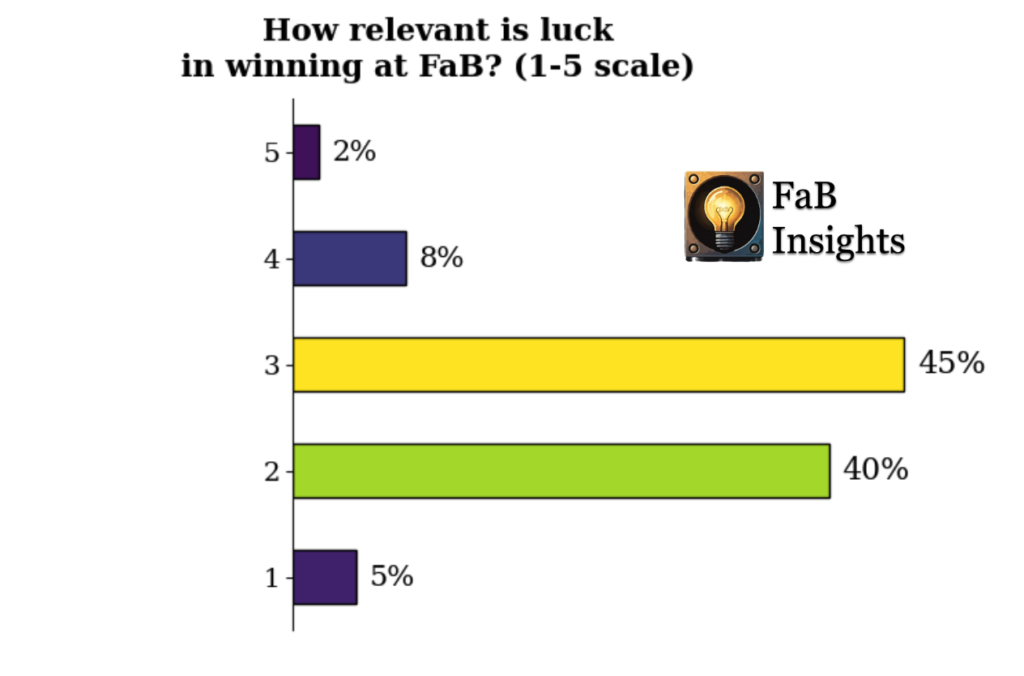
Interestingly, when it came to self-assessment, most players considered themselves average in skill, though there was a tendency for many to rate themselves higher. It’s a testament to the drive and ambition within the community!
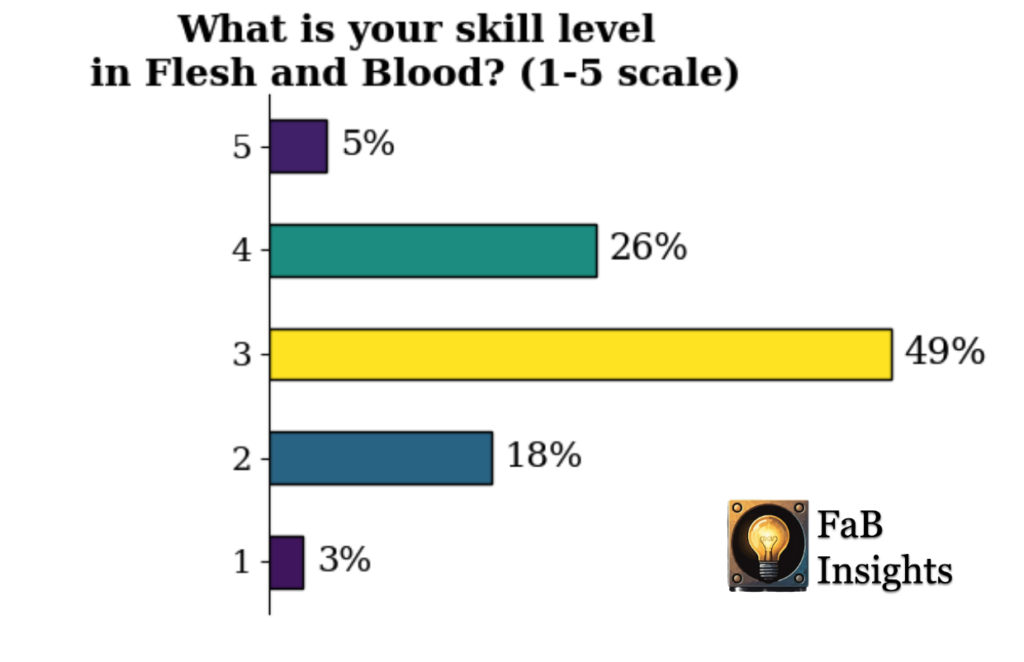
Playing Time and Achievements
The survey revealed a mix of newer and seasoned players, with a large proportion having played for over three years.
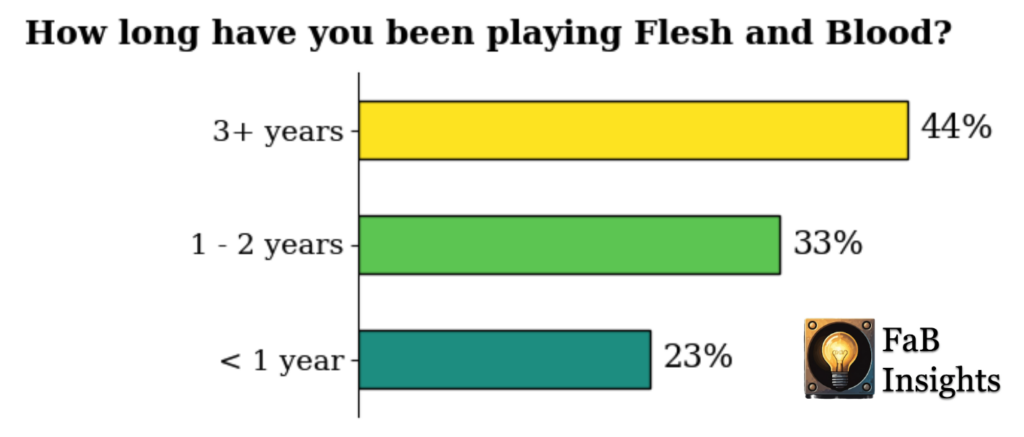
As you may have experienced on your own skin, repeatedly winning takes more than just luck, and achieving mastery takes countless hours of practice and dedication. In such a competitive landscape, the number of players who consistently achieve top placements is very limited, with less than 10% reporting being successful more than 50% of the times. As we will see later, it is the more seasoned players the ones more likely to make it to the top.
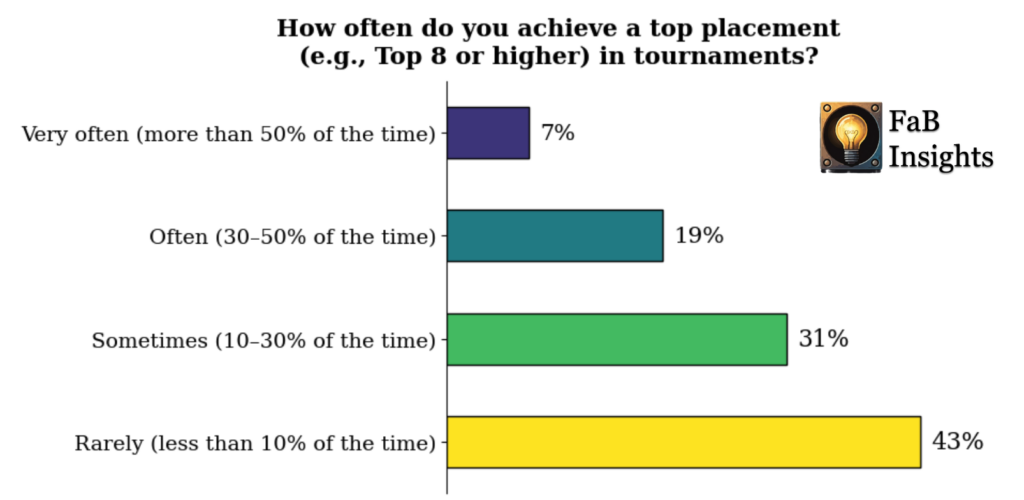
Interactions: How Factors Relate
To analyze the following interactions I clustered the answers given to the previous questions to divide players into groups based on low/high competitiveness (from the question “What is your primary goal in FaB?”), low/medium/high self-reported skill (grouped as 1+2/3/4+5 response options), relevance attributed to luck (as with skill) and 2 additional questions measuring emotional stability (degree of accordance with the statements “I see myself as someone who …is relaxed, handles stresswell. | …gets nervous easily.”)
Competitiveness and Skill
A strong correlation emerged between skill and competitiveness. Players with higher skill levels were more likely to identify as competitive, which is expected. But what’s interesting is that even players with medium skill levels exhibited a competitive edge. This suggests that Flesh and Blood fosters ambition at all levels, motivating players to improve and succeed.
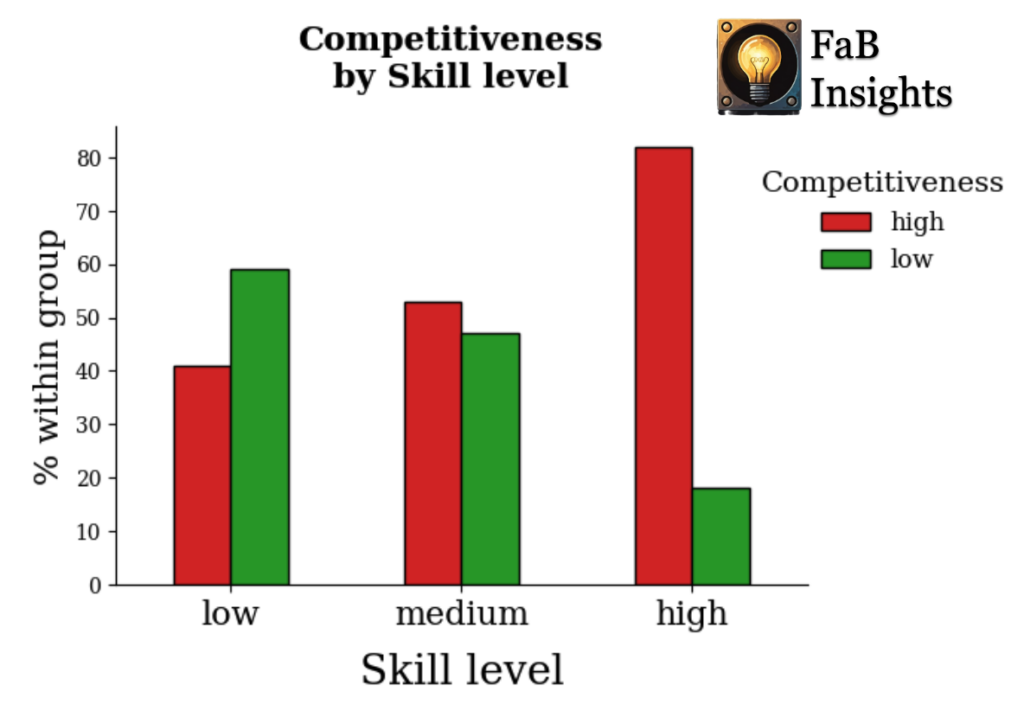
As expected, players who were more competitive tended to achieve top tournament placements more frequently. It’s clear that ambition and skill go hand in hand.
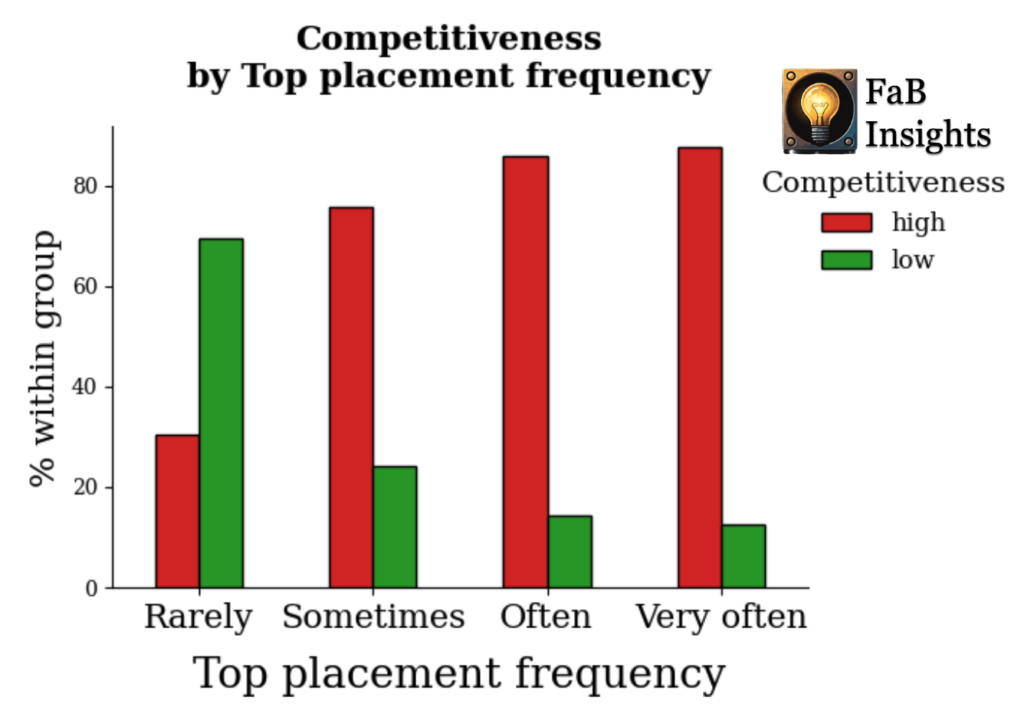
Experience and Success
Players with three or more years of experience reported a greater likelihood of frequent top placements. This emphasizes the value of experience and the importance of investing time into mastering the game. Perseverance wins.
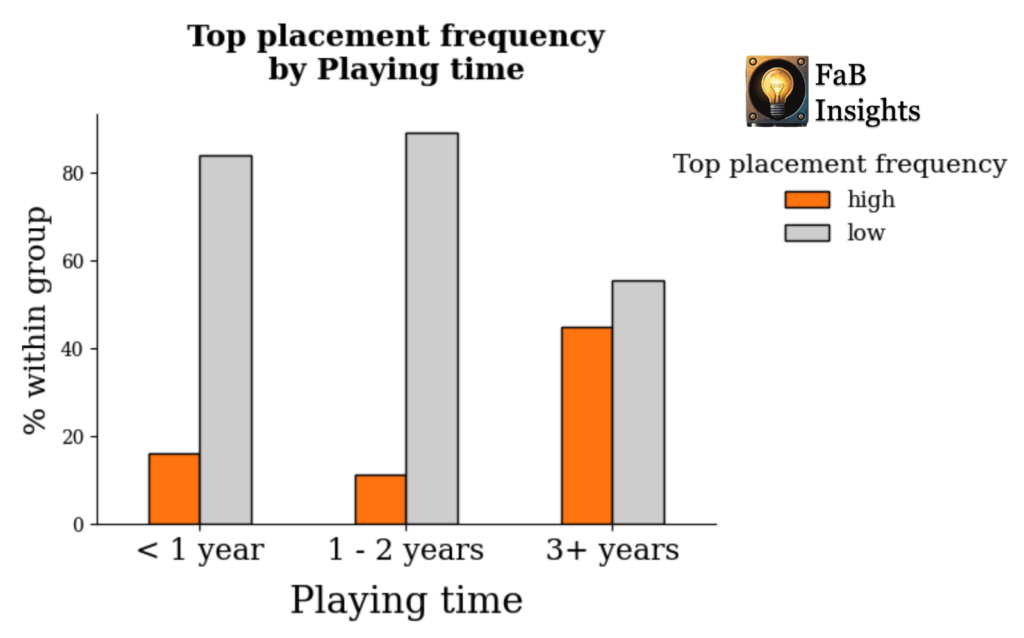
Additionally, the more time players spent playing, the higher they rated their own skill level. This further supports the idea that dedication and practice lead to improvement – or that the more one becomes skilled the more likely s/he will stick around for longer.
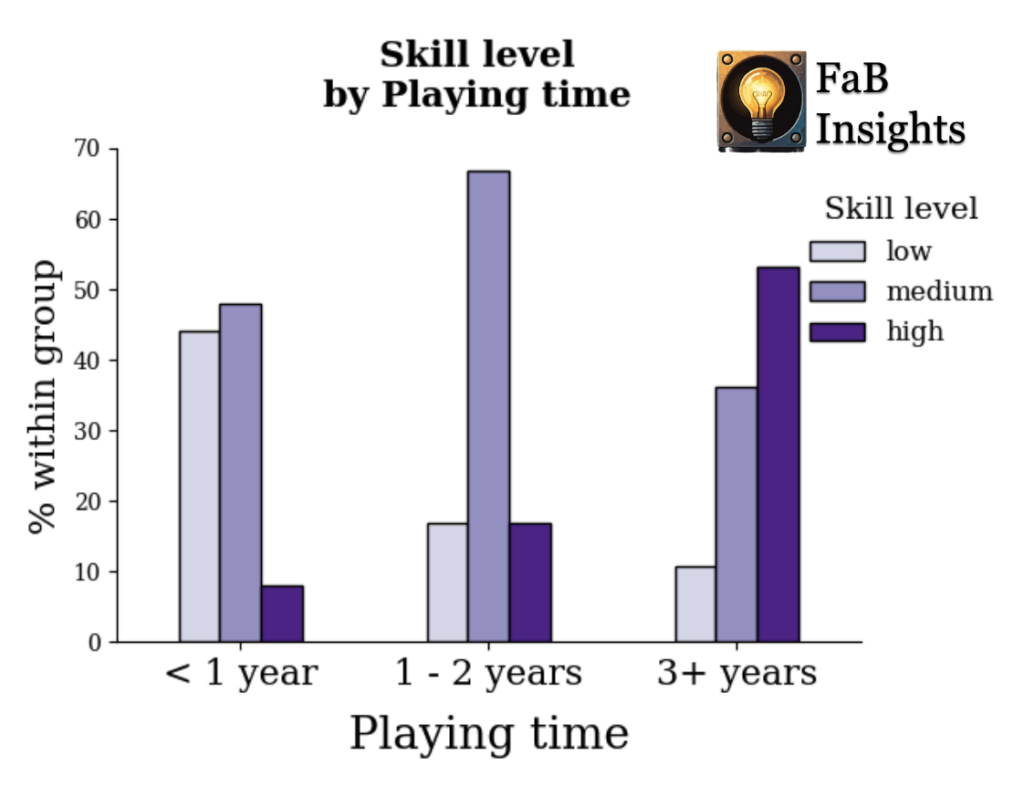
Luck and Success
An interesting pattern emerged when examining players’ views on luck versus skill. The more experienced and skilled players tended to recognize that, in order to reach the highest levels of success, luck plays a significant role. While many players initially focus on mastering strategy and skill, those who push for top-tier placements may understand that factors beyond their control—like luck—can make all the difference in highly competitive environments. This recognition suggests that top players aren’t just focused on refining their skills; they also acknowledge the unpredictable nature of the game and the influence luck can have on their results.
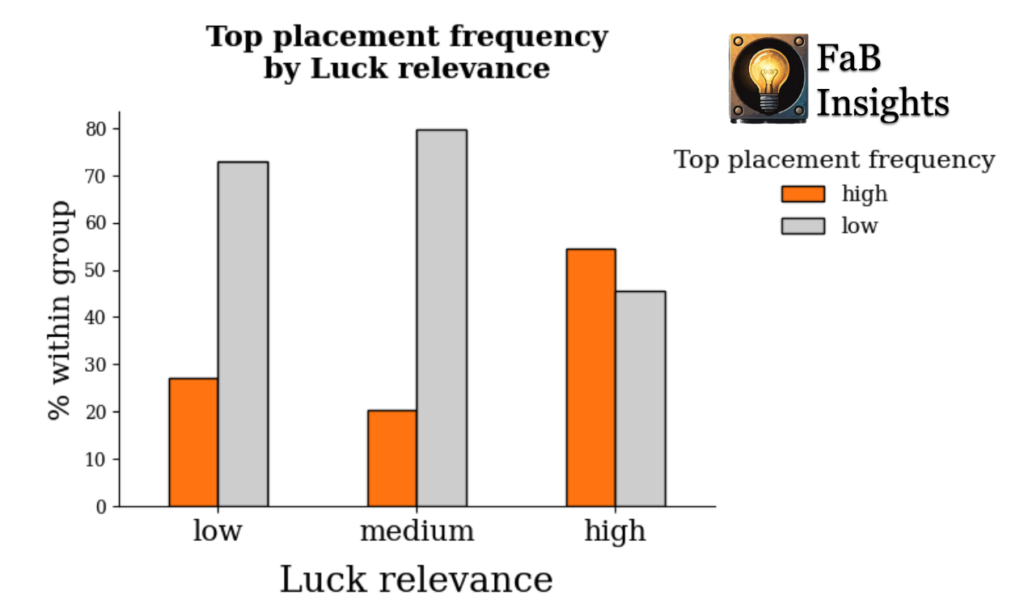
Emotional Stability and Longevity
Long-term players tended to report higher emotional stability. This doesn’t mean that playing Flesh and Blood for longer periods makes one more emotionally stable, but rather that those who are more resilient to the emotional ups and downs of competitive play could be more likely to stick around in the scene. This emotional stability may contribute to their continued success and enjoyment of the game.
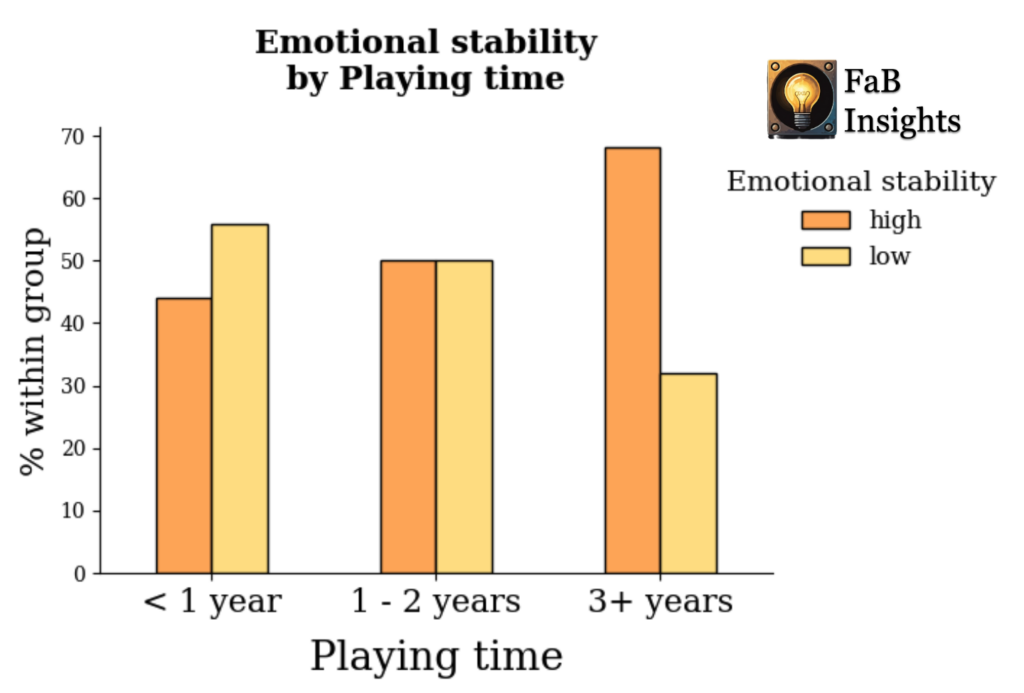
Final Thoughts
Thank you for sticking with me all the way to the end! I hope you enjoyed the article and found it as intriguing to read as it was to create. Now, let me share some personal reflections and a glimpse behind the scenes.
At The Calling in Florence, I learned firsthand just how exhausting these events can be. This time, I came prepared—or so I thought—but by Sunday, the fatigue hit hard. Honestly, I didn’t feel up to surveying more than 100 people, and I wasn’t willing to compromise on that goal. Adding to my hesitation, it was lunchtime, and my group was urging me to explore Prague for a few hours. I was on the verge of packing it in when one of the respondents from the Florence survey approached me with genuine enthusiasm, asking if I was conducting another survey. (thanks Lorenzo)
In that moment, I realized: people (beyond my very supportive girlfriend) actually care about this – at least some – and I wasn’t about to let them down. Sorry, Prague—you’ll have to wait. (Besides, I’d already seen you 10 years ago!)
Suddenly, the tiredness faded. I put on my best smile to mask my shyness, grabbed my phone, and dove into the crowd. Throughout the event, judges kept playfully asking, “Are you the hunter or the hunted?” Well, by the time I reached my 109th respondent, I had an answer. My smart band reported over 17,000 steps, I’d repeated my pitch more than 50 times (thankfully, I’d learned to target groups), and I felt a small resurgence of exhaustion. By the time I got in the car, that tiredness turned into nausea—a fitting reminder of the effort this took.
Reflecting on the experience, I wouldn’t change a thing. Seeing the community’s passion firsthand and hearing their thoughts made it all worthwhile. It’s moments like these that remind me why I love this game and its players.
Thank you for being part of this journey. Whether you’re a seasoned competitor, a casual player, or just curious about Flesh and Blood, I hope these insights inspire you as much as they’ve inspired me.


